Let the true light of the gospel shine in Uganda
Pastor Cao Huiji’s short-term missionary experience sharing
Interview/Yu Yunji
Translation/Yu Guoliang
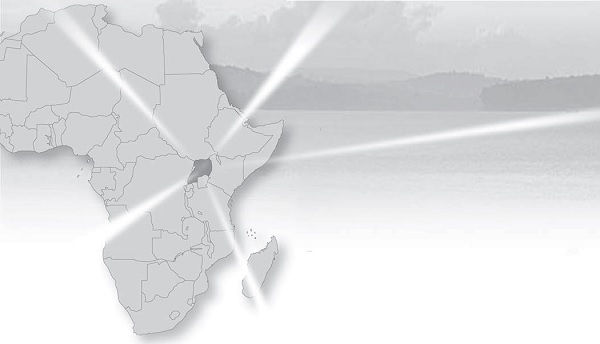
Pastor Cao Huiji is the English pastor of Xiaoshidun Chinese Church. He has twice led short-term mission teams to Uganda. It is an honor to interview him and share his experience with readers.
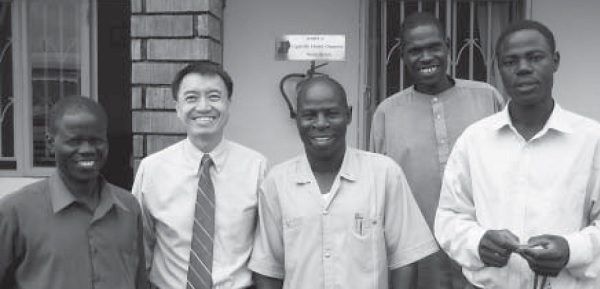
▲Pastor Cao Huiji (second from left) takes a photo with the Ugandan pastoral team.
1. Question: Your church has been sending short-term mission teams to Africa for many years. Please share the history of your missionary work.
answer:The missionary work of Xiaoston Chinese Church has always been concentrated in Southeast Asia, but I have always hoped that our ministry could expand to other corners of the world. Since God put the vision of missionary work in Africa into my heart, we have cooperated with the African missionary agency "e3 Partners" and organized a missionary team of eight people. In the past, members of our church have gone on missionary trips to Africa with "e3 Partners". There are also several members who are studying medicine and have done short-term missionary work in various parts of Africa through the arrangement of the school.
2. Question: How did you get involved in this ministry?
answer:I didn’t directly participate in short-term missions for several years, until the church’s missionary pastor encouraged me to lead a team there. I began to pray about it, asking God where would it be best for me to go on missions? God moved me to go to poor countries, places where I have experienced a lot of pain, to minister to those suffering from AIDS.
I ask God to give me a heart of mercy and know how to serve those poor and suffering people; I ask God to open my eyes so that I can see their needs and bring them hope with the gospel of Jesus Christ. So, God put Africa on my heart. I chose Uganda because I wanted to go to an English-speaking country and it would be easier to interact with them.
I know some pastoral staff who have worked with e3 partners with good results. I was impressed by the vision of e3 partners and their strategy for working with local churches in the mission field.
e3 refers to Evangelizing, Equipping and Establishing. The ultimate goal of missionary work is to equip local believers and establish new churches. As Americans, we cannot stay for a long time. Our top priority is to train local African Christians to do the work of evangelism and cultivation, so that they will not be able to continue after the missionaries leave. Local African churches also have the responsibility to train pastors to oversee new churches who are willing to mobilize their members to accept American evangelism and discipleship training. This African evangelical strategy, which focuses on cultivating local churches and does not rely on missionaries, is a feasible way in line with biblical principles.
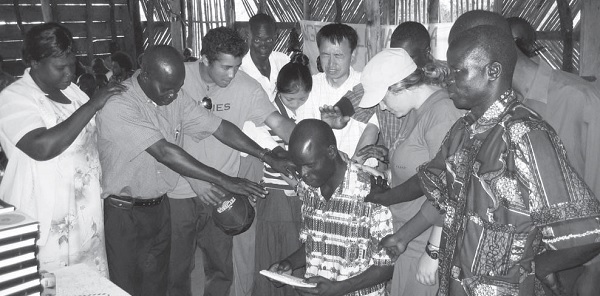
▲Participate in and send local pastors to do church planting ministry.
3. Question: What preparations will your short-term mission team make before setting off?
answer:The mission committee held three training courses to help team members understand the cultural background and know how to preach the gospel to the local people. There are some tools that can help us share our testimonies and preach salvation, such as using the "Gospel Wisdom Cube". Each side of the cube is a picture related to the gospel, which can easily open up the topic of the gospel.
The mission committee also supports us in logistical aspects, such as how to get vaccinations, apply for passports, etc. Our team members will also find support partners to pray for the short-term mission team, and allow team members to practice testifying and evangelizing in front of them.
4. Question: Please share your typical day’s work flow during your missionary work in Uganda.
answer:Our short-term mission team in Uganda is composed of thirty-five members from various churches in the United States. We were divided into seven groups, and each group involved local people in order to train them to preach the gospel. Seven teams of us were scattered to different places with the purpose of planting seven churches.
The most commonly used means of transportation is walking. Most people can walk to the church in about fifteen minutes from where they live. The church usually meets outdoors, such as setting up a tent under a mango tree, and is called a mango tree church. In the morning, the American team members will worship, pray, practice spirituality and listen to teachings together to start the day's work. Immediately afterwards, I took a bus or truck to meet other Ugandan teammates in the village and shared the gospel from house to house.
It is common here for women to cook outdoors or take care of children. We will explain to them that we have something to share with them and ask them to find some villagers and elders living nearby. They would go into the shack and take out carpets for us to sit on, and occasionally they would bring wooden chairs, and a large group of people would sit around and listen to the gospel. Thank the Lord, many people are willing to accept Jesus as their personal Savior.
Those who accepted the gospel were mostly women, children, or the elderly. With the joint efforts of Christians in both countries, a total of 926 people decided to believe in the Lord and seven churches were established.
We preached the gospel in the morning, had a simple meal at lunch, mostly biscuits and water, and then prepared for the discipleship course in the afternoon. New believers will be invited to the church planting location, such as under the mango tree, where the local pastor will distribute discipleship materials and teach them the truth of faith.
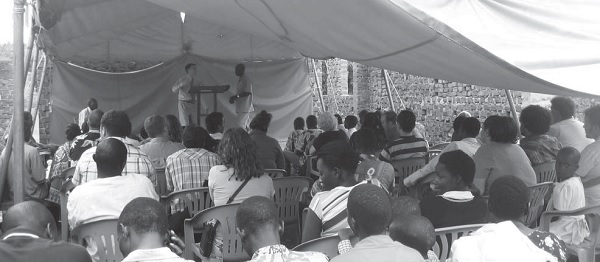
▲The local church in Uganda often sets up tents for gatherings. The picture shows Pastor Cao being invited to preach.
5. Question: What are the obstacles to preaching the gospel?
answer:Here are three major obstacles to evangelizing them:
*People are very superstitious - witch doctors have great influence in villages, evil spirits are active in Africa, and possession by evil spirits is common. These things are not common in the United States.
*This is a society that tolerates polygamy. Men resist the gospel because they are unwilling to give up their right to have multiple wives.
*Poverty─We met people brewing moonshine on the roadside in order to increase their income. Some people are afraid that they will lose this part of their income after accepting the gospel.
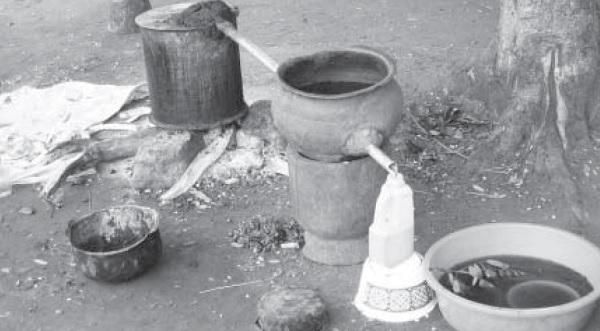
▲It is difficult for locals to make a living, so many people brew private wine and sell it on the roadside.
6. Question: In Uganda, when did you feel that God was particularly with you?
answer:When I went to Uganda for the first time, I was honored to be invited to preach at a large local church. I enjoyed their cheers and spiritual worship, and I was grateful that my sermons could be translated into the local language, Alur.
While we were visiting the countryside, an unforgettable thing happened. As I was walking through a clearing with a Ugandan friend and his wife, an angry man emerged from the shack to greet us, saying that we were trespassing on private property and trying to spy on his secret rituals.
This man was the village chief and a witch doctor, and he ordered us to be "arrested". We were detained for more than three hours and witnessed a bloody cult dance and the sacrifice of a ram whose blood was smeared on the tongues of everyone in attendance.
However, the witch doctor's nephew was very friendly to us and invited us to rest in his shack. We had a great conversation and we even encouraged him to leave this cold faith. Finally, a local pastor brought a police officer and rescued us. Under the guidance of God, the local pastor also shared the gospel with the witch doctor.
7. Question: What did you learn during your short-term mission?
answer:The biggest learning is: God is powerful - He only requires us to obey His leadership. God Himself wins souls, casts out evil spirits, performs miracles that only He can perform, and spreads the gospel widely.
Second, I deeply appreciate the goodness of the body of Christ. We come from different denominations, ages, socioeconomics, identities, and clans, but we can preach the gospel side by side. It is truly a wonderful connection. We are all one in Christ.
My two trips to Uganda opened my eyes. I saw so many poor people. In comparison, although we are materially rich, to some extent, these Africans who are poor in materials are spiritually poorer than us. satisfy.
Finally, seeing the Christians in Uganda worshiping God with all their heart, soul, and mind, I was deeply moved and inspired me to love the Lord even more.
8. Question: Some of our readers may be thinking about missions in Africa. What advice do you have for them?
answer:God knows what we are capable of, He knows what we can handle. Different ethnic groups have different difficulties to face, such as primitive living environment, intense heat, beetles, completely different cultures, safety, sanitation, ability to train natives, possession by evil spirits, etc. If we seek God wholeheartedly, He will give us the grace to face different challenges and difficulties.
Go for it! God will strengthen your faith - all He asks is that you have a willing heart!
Get to know Uganda
The land in Uganda is fertile and can be harvested three times a year. The main export product is coffee. More than 80% people are engaged in agricultural work. The economy was stable in the 1960s, but since the expulsion of Asian businessmen in 1972, dictatorships and civil wars have continued, causing the economy to decline rapidly. The economy has slowly improved since 1992, but war, AIDS and other diseases have left most of the population living in poverty. The estimated average national income in 2008 was US$1,100.
Uganda gained independence from the British in 1962 and elections are held every five years, but the president can be re-elected indefinitely. In 1986 Yoweri Museveni came to power and remains the head of state to this day.
The country's population in 2008 was 33 million. People in 13% live in cities, and the median age is fifteen.
There are four major ethnic groups in the country, the largest is Bautu, accounting for 64.8% of the population, and the official language is English. People in 67% are literate, but the villagers' knowledge of English is limited and translation is often needed.
More than 80% people claim to be Christians, but most of them are in name only. Only 7% are truly born-again Christians. According to 2002 statistics, 41.9% were Roman Catholics and 35.9% were Episcopalians. In rural areas, elfism and witch doctors are popular, there is no electricity or running water, most people are farmers and fishermen, and the unemployment rate is high. The government provides primary education. Most people are unable to continue their education due to high tuition fees.
This is a society dominated by men, women are second-class citizens, polygamy is prevalent, and sexual indulgence is rampant. People of the same family often live in the same village. With a large family size, it is common for young people to take care of young people. Generally speaking, local children are better behaved than American children. Fifty children can sit together quietly, obey the leadership of adults, and participate in activities. They are very hospitable and treat their guests with the best gifts. Witch doctors still occupy a leading position in ordinary people's lives.
 Journalist profile
Journalist profile
From left, Pastor Cao is pictured with Yu Yunji and Yu Guoliang. Yu Yunji is the daughter of Yu Guoliang, the editor of the national outreach unit of this magazine. One year after she joined the Xiaoshidun Chinese Church, she designed and edited a publication specially produced by the church for women. Currently working as a pediatrician in Sugar Land, a suburb of Houston. In his spare time, he enjoys writing, cooking, traveling, and photography.
